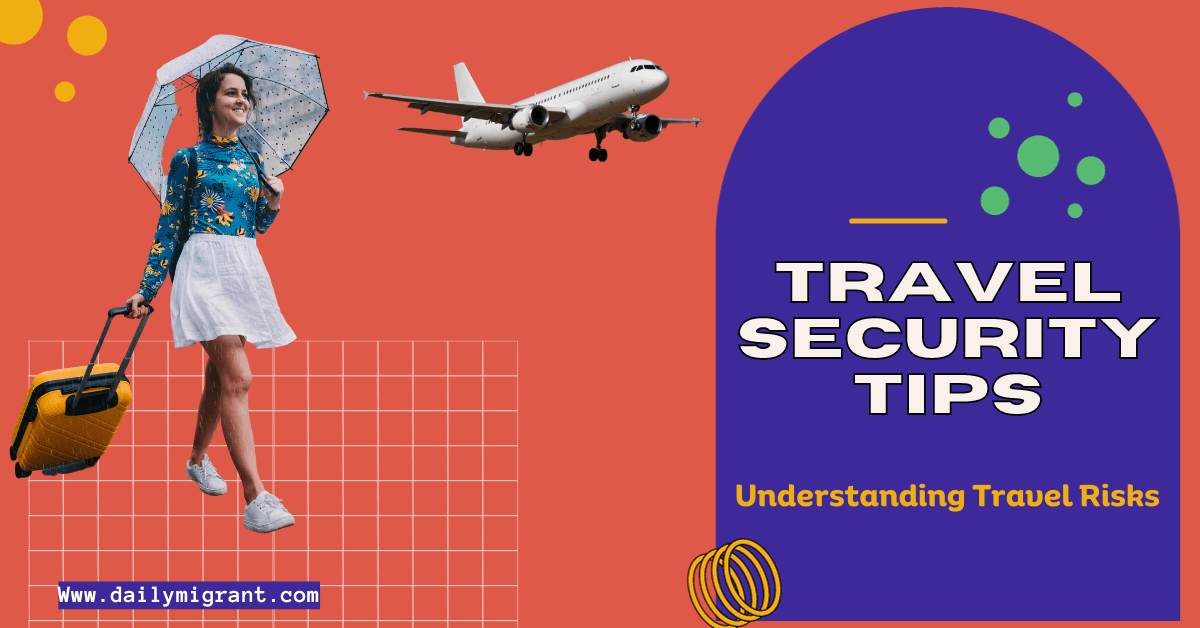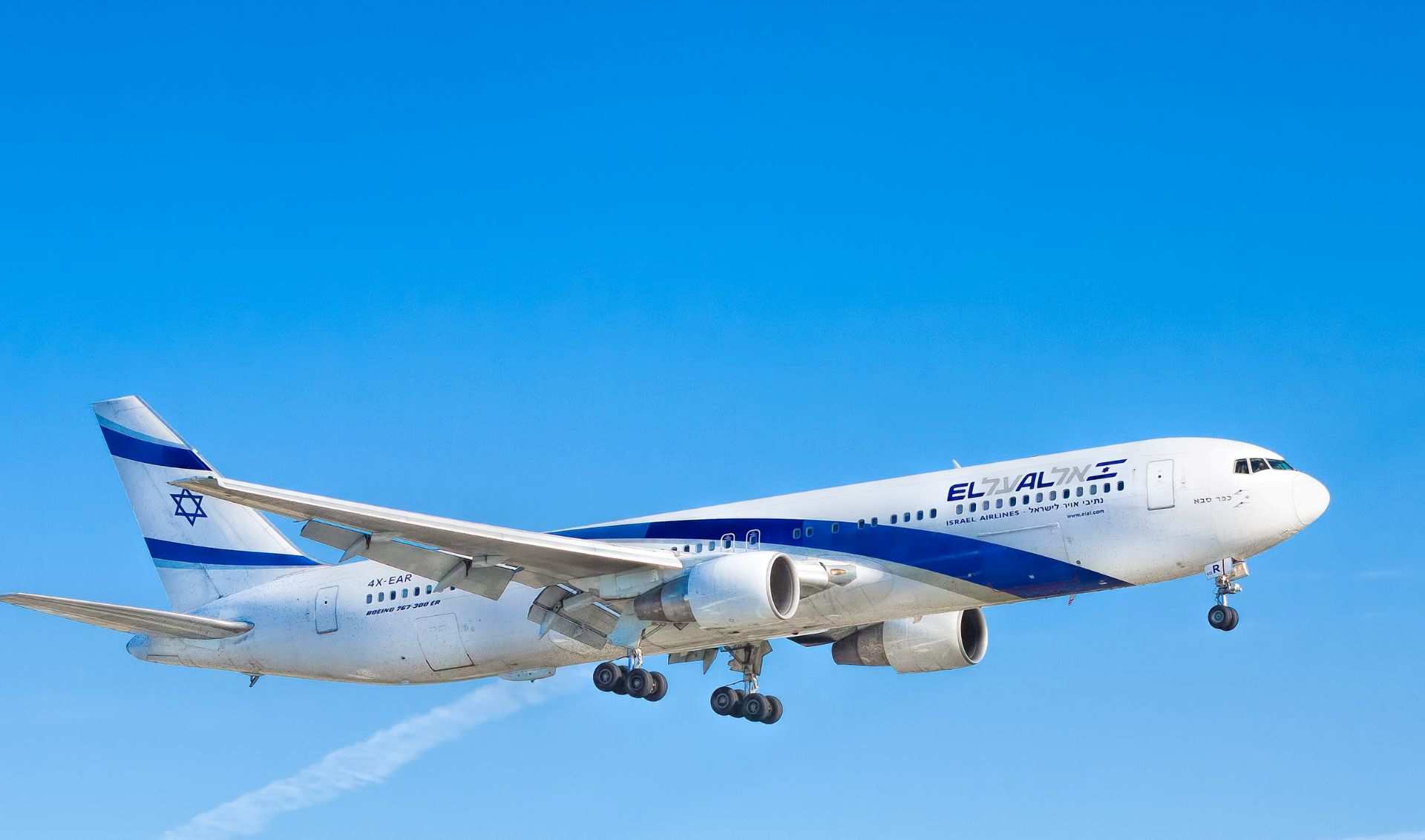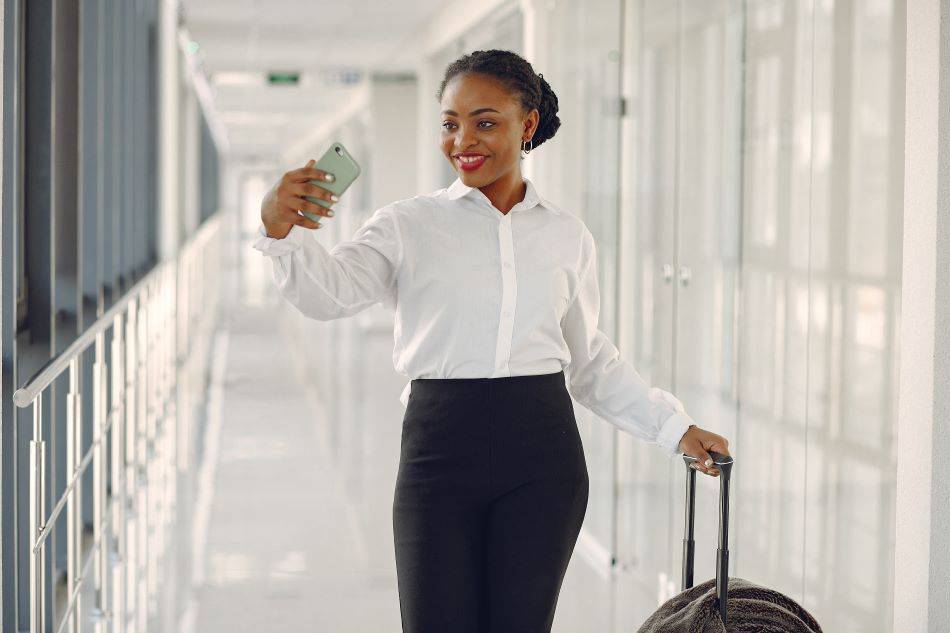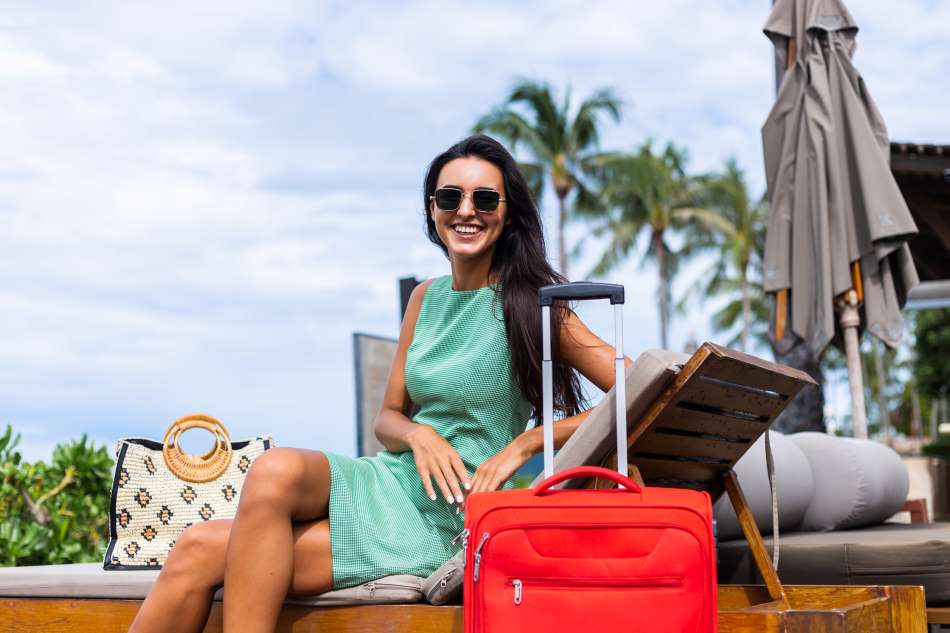Introduction
Traveling is an exciting and enriching experience that allows us to explore new cultures, meet people from different backgrounds, and create lasting memories.
However, amidst the thrill of exploring new places, it’s essential to prioritize your safety and the security of yourself and belongings.
Travel security should be a top concern for every traveler, whether you’re embarking on a solo adventure, a family vacation, a business trip, or a group expedition.
In this comprehensive guide on, Daily Migrants, we’ll get to understand the Travel Security Tips that will help you protect yourself and your belongings during your travels.
Understanding Travel Risks
Before you embark on your journey, it’s crucial to research and understand the specific travel risks associated with your destination.
Different regions may have varying safety concerns, including crime rates, health risks, political instability, and natural disasters. Here are some essential steps to assess and mitigate these risks:
Research: Use reputable sources like government travel advisories, travel forums, and guidebooks to gather information about your destination. Understand the local customs, culture, and laws.
Consult with Travel Experts: Talk to travel agents or experts who have experience with your chosen destination. They can provide valuable insights and recommendations.
Check for Travel Warnings: Stay updated on any travel warnings or alerts issued by your government for your destination. These warnings can provide essential safety information.
Register with the Embassy: If you’re traveling to a high-risk area, consider registering with your country’s embassy or consulate. They can assist you in case of emergencies.
Pre-Trip Planning
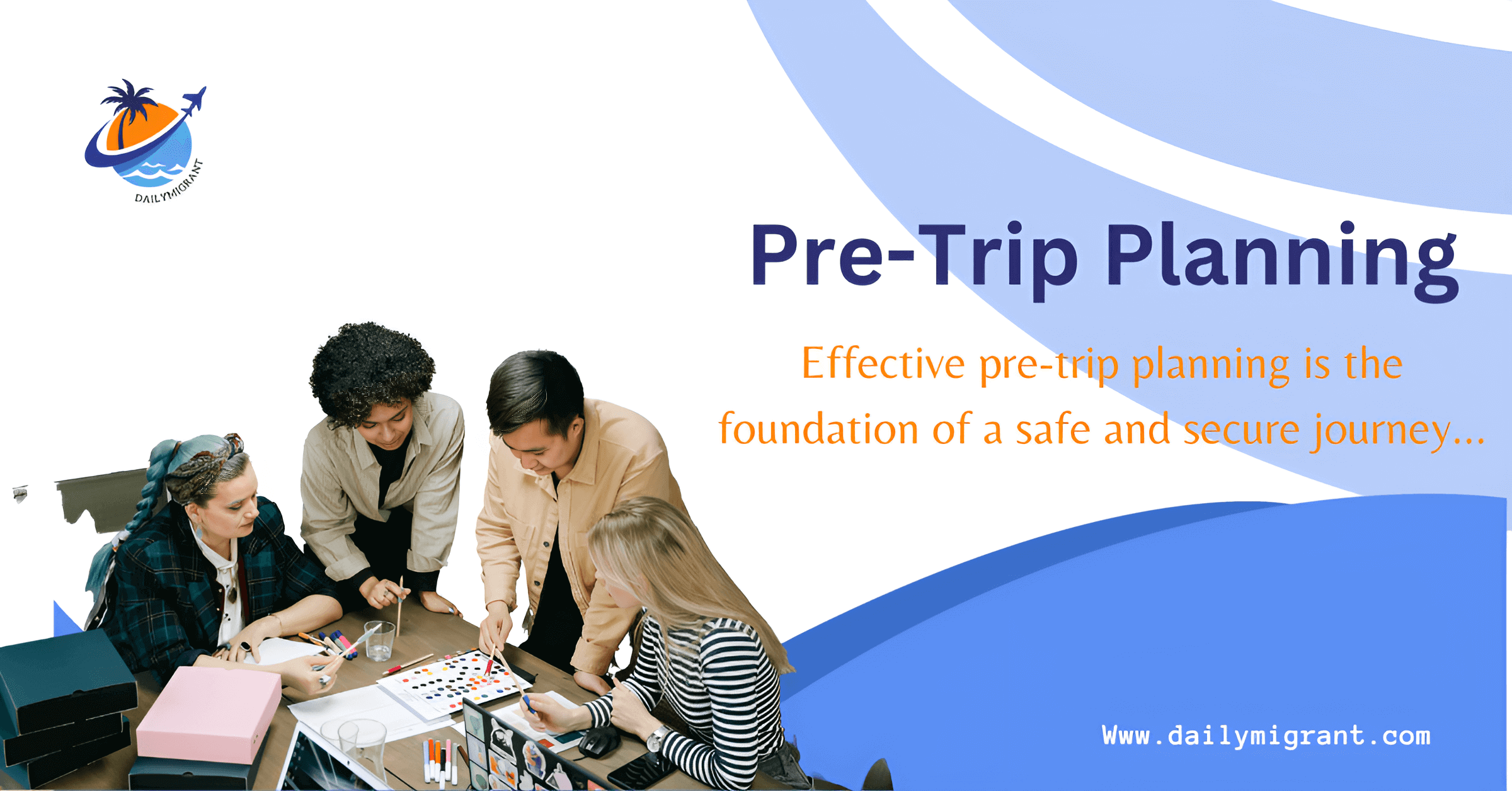
Effective pre-trip planning is the foundation of a safe and secure journey. By taking the time to prepare adequately, you can minimize risks and ensure a smoother travel experience:
Travel Insurance: Invest in comprehensive travel insurance that covers medical emergencies, trip cancellations, and lost belongings. Read the policy carefully to understand what’s covered
Itinerary and Contact Information: Share your travel itinerary and contact information with a trusted friend or family member. Provide details about your flights, accommodations, and any planned activities.
Photocopies of Documents: Make photocopies of essential documents like your passport, visa, driver’s license, and travel insurance policy. Keep these copies in a separate location from the originals.
Secure Your Home: Ensure your home is secure before leaving. Lock all doors and windows, set alarms if you have them, and ask a neighbor to keep an eye on your property.
Local Currency: Carry a small amount of local currency for immediate expenses upon arrival. Familiarize yourself with the exchange rate to avoid scams.
Travel Apps: Download essential travel apps, such as maps, translation, and currency conversion apps, to help you navigate and communicate.
Safety During Your Journey
Once you’re on the road, staying safe requires ongoing vigilance and adherence to good travel practices:
Stay Aware: Pay attention to your surroundings and stay aware of your belongings at all times. Avoid distractions like excessive use of smartphones in public places.
Public Transportation: Be cautious when using public transportation, especially in crowded areas. Keep your bags and pockets secure, and be wary of pickpockets.
Avoid Risky Areas: Research and avoid high-crime areas, especially at night. Stick to well-lit and populated areas when walking alone.
Travel Companions: If you’re traveling with companions, establish a meeting point in case you get separated. Share important contact information with each other.
Hotel Safety: Use hotel safes to store valuable items like passports, jewelry, and extra cash. Lock your hotel room when you leave, and use door wedges for added security.
Emergency Contacts: Keep a list of emergency contacts, including local authorities and the nearest embassy or consulate, in your phone or wallet.
Protecting Your Belongings
Theft and loss of belongings are common travel hazards. Implement these strategies to safeguard your possessions:
Anti-Theft Bags: Consider using anti-theft bags and accessories designed with security features like lockable zippers and slash-resistant straps.
Money Belt: Invest in a money belt or neck pouch to keep essential items like passports, credit cards, and cash hidden under your clothing.
Luggage Locks: Use TSA-approved luggage locks to secure your bags. These locks allow security personnel to inspect your luggage without damaging the locks.
Back-Up Credit Cards: Carry a backup credit card and keep it separate from your primary card. This ensures you have access to funds in case one is lost or stolen.
Photograph Valuables: Take photos of your valuable items, including electronics and jewelry. This can help with insurance claims in case of loss or theft.
Digital Security
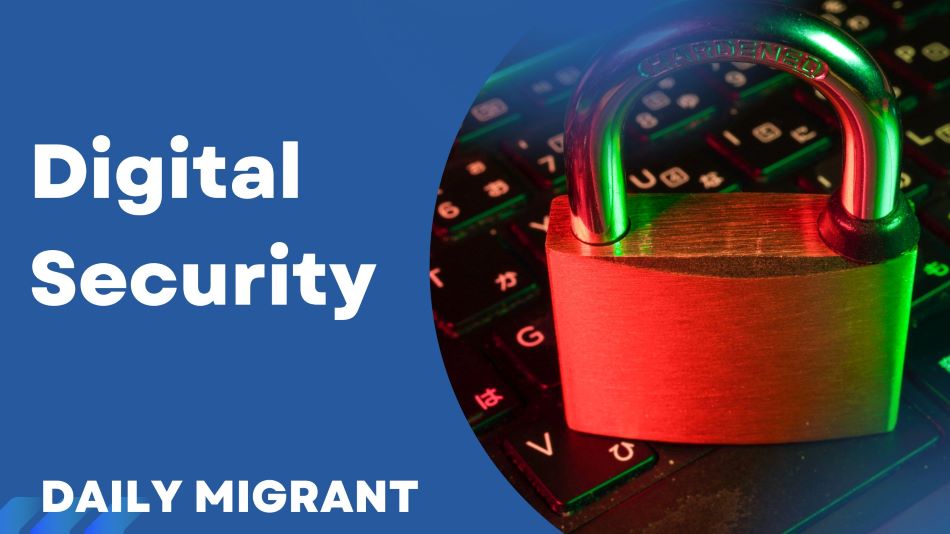
In today’s digital age, protecting your online identity and data is as crucial as physical security. Follow these digital security tips:
1. Use Secure Wi-Fi: Avoid using public Wi-Fi networks for sensitive transactions. If necessary, use a virtual private network (VPN) to encrypt your internet connection.
2. Password Management: Use strong, unique passwords for online accounts. Consider using a password manager to store and generate complex passwords.
3. Two-Factor Authentication (2FA): Enable 2FA for your email and important accounts to add an extra layer of security.
4. Backup Data: Regularly back up your important data and documents to a secure cloud service or an external hard drive.
5. Beware of Scams: Be cautious of phishing emails and fraudulent websites. Verify the authenticity of any requests for personal or financial information.
Health and Medical Precautions
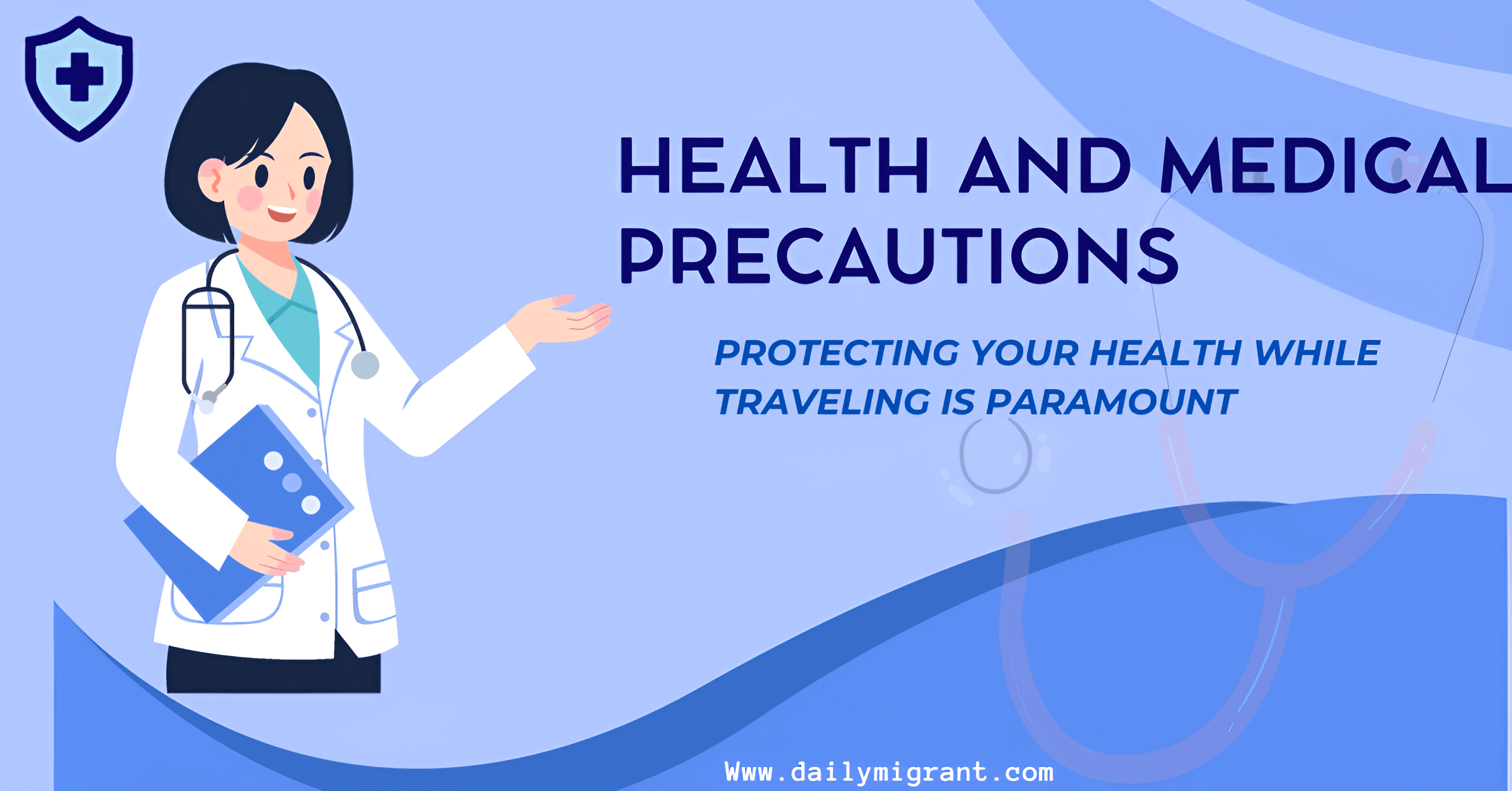
Protecting your health while traveling is paramount. Consider the following health and medical precautions:
1. Vaccinations: Check if any vaccinations are required or recommended for your destination and ensure you are up to date on routine vaccinations.
2. Prescription Medications: Carry a sufficient supply of prescription medications, along with a copy of the prescription from your healthcare provider.
3. Travel Health Insurance: Make sure your travel insurance includes coverage for medical emergencies and evacuation if needed.
4. Stay Hydrated: Drink bottled or purified water to prevent waterborne illnesses. Avoid ice in your drinks unless you’re certain it’s made from safe water.
5. Sun Protection: Use sunscreen, sunglasses, and protective clothing to shield yourself from the sun. High-altitude destinations may require extra precautions.
6. Food Safety: Be cautious when eating street food or in areas with questionable food hygiene. Opt for cooked and hot meals from reputable establishments.
Interacting with Locals
One of the joys of travel is interacting with locals and immersing yourself in the culture. Here’s how to do it safely:
1. Cultural Sensitivity: Learn about the local customs and etiquette to show respect to the culture you’re visiting. This can help you avoid unintentional offense.
2. Language: Try to learn some basic phrases in the local language. This can go a long way in fostering positive interactions.
3. Ask for Advice: If you’re unsure about a situation or need recommendations, ask local residents or fellow travelers for advice.
4. Trust Your Instincts: If a situation or person makes you uncomfortable, trust your instincts and remove yourself from it.
5. Be Mindful of Alcohol: Excessive alcohol consumption can impair judgment and make you vulnerable. Drink responsibly and be cautious when accepting drinks from strangers.
Emergency Preparedness
Despite careful planning, emergencies can happen. Being prepared can make a significant difference:
1. Emergency Kit: Pack a small emergency kit with essentials like a flashlight, first-aid supplies, a whistle, and any necessary medications.
2. Emergency Contacts: Save emergency contact numbers in your phone and write them down in case your phone is lost or stolen.
3. Know Local Emergency Services: Familiarize yourself with the local emergency services number for police, medical assistance, and fire.
4. Travel Companion Information: Ensure your travel companions know about any medical conditions or allergies you have in case you need assistance.
5. Travel Insurance Contact: Have your travel insurance company’s contact information readily available for quick access.
Post-Trip Security Measures
After returning from your trip, it’s essential to take some post-trip security measures to ensure a smooth transition back home:
1. Check Financial Statements: Review your credit card and bank statements for any unauthorized charges. Report any discrepancies immediately.
2. Change Passwords: Change the passwords for your online accounts, especially if you use public computers or Wi-Fi during your travels.
3. Inspect Your Belongings: Inspect your luggage and belongings for any damage or theft. File a report with the airline or hotel if necessary.
4. Deactivate Travel Services: If you activated any temporary services like international phone plans or data roaming, deactivate them to avoid additional charges.
5. Reflect and Learn: Take some time to reflect on your trip and learn from your experiences. Consider what went well and what could be improved for your next adventure.
YOU CAN ALSO READ: Flights from Mexico City to Oaxaca
Top 9 Security Tips for Traveling in the United States
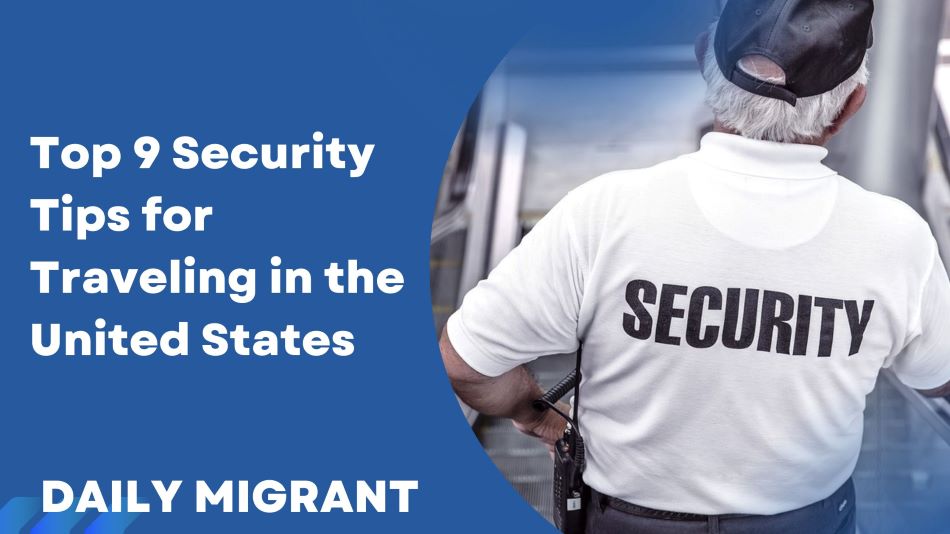
Traveling to the United States can be an exciting and memorable experience, but ensuring your safety and security should always be a top priority.
The diverse landscapes, bustling cities, and unique cultural experiences are just a few of the reasons why millions of tourists visit the U.S. each year.
Daily migrants have provided enough here, To help you have a safe and enjoyable trip, here are the top 10 Travel Security Tips for traveling in the United States.
These are the Top 9 Security Tips for Traveling in the United States:
1. Research Your Destination: Before you go, research the areas you plan to visit. Familiarize yourself with local customs, laws, and potential safety concerns. Stay updated on current events in the region, as these can impact your travel plans.
2. Travel Insurance: Invest in comprehensive travel insurance that covers medical emergencies, trip cancellations, and lost belongings. This provides peace of mind in case the unexpected happens.
3. Secure Your Belongings: Use hotel safes to store your passport, important documents, and valuables. When you’re out and about, carry only what you need in a secure, anti-theft bag.
4. Stay Informed: Sign up for travel alerts and advisories from your government’s embassy or consulate. These notifications can provide crucial information about safety concerns in your destination.
5. Use Reputable Accommodations: Choose well-reviewed hotels and accommodations. Read online reviews and ask for recommendations from trusted sources to ensure you’re staying in a safe and reputable place.
6. Stay Connected: Have a reliable means of communication, such as a local SIM card or international phone plan. Share your travel itinerary with a trusted friend or family member and check in regularly.
7. Public Transportation Safety: When using public transportation, keep an eye on your belongings and be cautious of pickpockets. Use designated taxi services or rideshare apps for safe transportation.
8. Emergency Numbers: Memorize or save important local emergency numbers, including the police, fire department, and medical services. In the U.S., the emergency number is 911 for all types of emergencies.
9. Travel Documents: Keep copies of your passport, visa, and other important documents in a separate location from the originals. You can also store digital copies in a secure cloud service for easy access.
While the United States offers a diverse range of attractions and experiences for travelers, it’s essential to prioritize your safety and security during your visit.
By following these top 10 Travel Security Tips you can help ensure that your trip is not only enjoyable but also worry-free.
Remember that staying informed and being proactive is key to a safe and memorable journey in the U.S.
FAQS ON Travel Security Tips
Lasting memories and experiences
Lasting memories and experience is one of the major reasons why traveling is important.
Traveling abroad provides you the opportunity to create memories that will last a lifetimem, starting from the new foods you will eat, to the people you will meet and the places you will visit, every experience will be unique, memorable, and special.
3. What are 5 personal safety rules?
Personal Security Tips
- Be alert and aware.
- Display confidence.
- Trust your instincts.
- keep your hands free.
- Ask for help.
- It Makes You More Mentally and Physically Healthy. …
- It Can Improve Your Communication Skills. …
- Traveling Can Expand Your Horizons. …
- Traveling Can Make You More Mindful of Other People’s Culture and Values.
- It Can Help You Make Memorable Memories.
Conclusion
In conclusion, traveling the world is a rewarding experience that can broaden your horizons and create lifelong memories.
While it’s important to embrace new cultures and experiences, it’s equally crucial to prioritize your safety and the security of your belongings.
By following these Travel Security Tips and staying vigilant, you can enjoy your journeys with peace of mind, knowing that you’ve taken steps to protect yourself and make the most of your adventures.
Safe travels!
